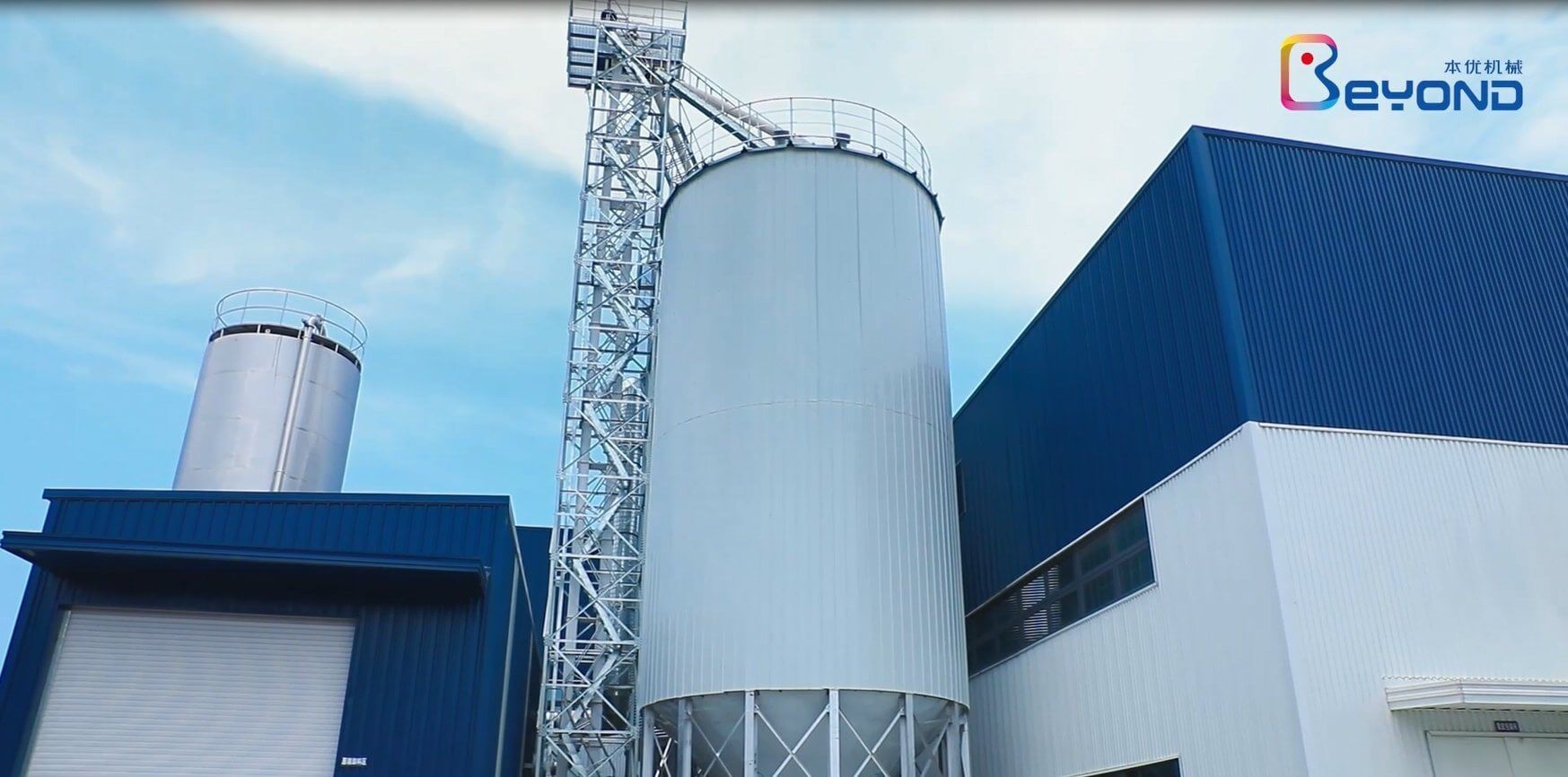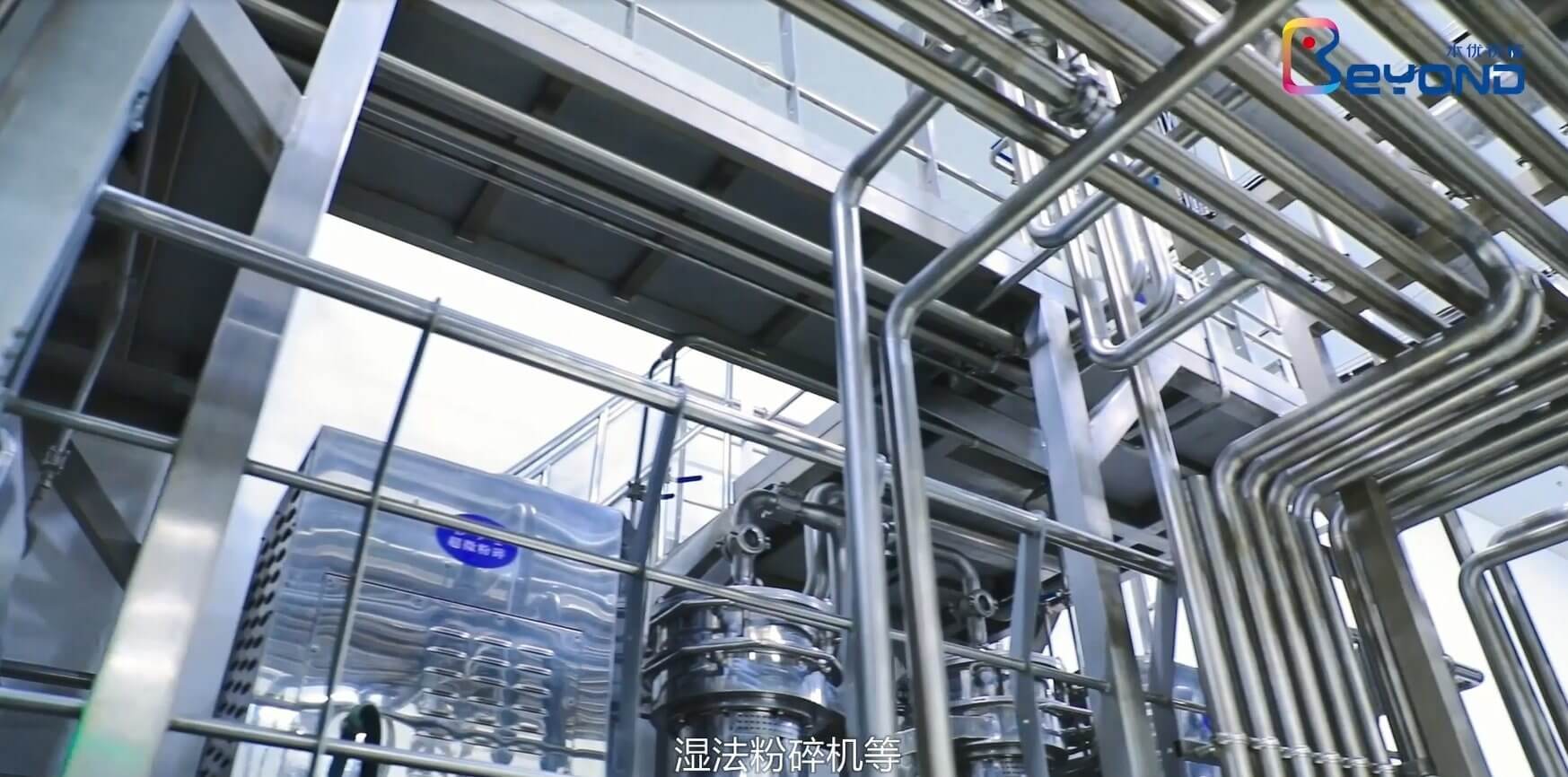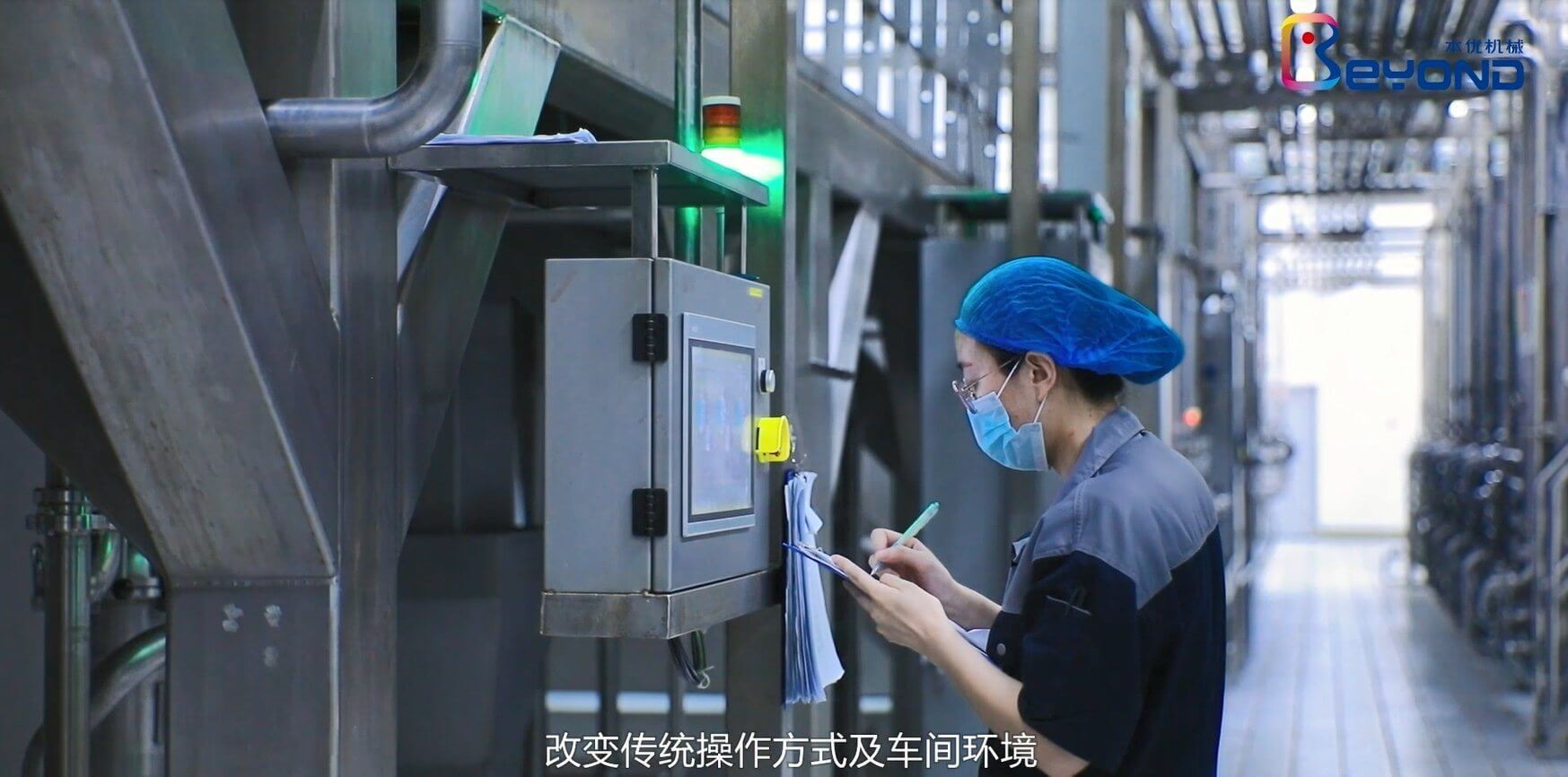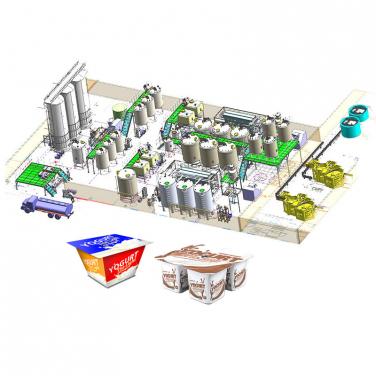
Dairy Turnkey Projects refer to a one-stop solution provided to dairy processing enterprises from design, construction to commissioning and delivery. This project covers all aspects of dairy production, including factory site selection, building design, equipment procurement and installation, production line debugging, employee training, etc., ensuring that customers can directly put the project into operation after completion. The following is the detailed content of the dairy turnkey project:
1、 Project Planning and Design
1. Requirement analysis:
Determine the annual output, processing capacity, and main production equipment of the factory based on the customer's business scale, market positioning, and product line requirements.
• Consider the possibility of future expansion and ensure that the design is flexible and scalable.

2. Raw materials and products in dairy turnkey projects
In the turnkey dairy project, selecting high-quality raw materials is the foundation for ensuring product quality and safety. The following are common dairy processing materials:
1. Fresh milk:
• Source: Usually purchased directly from dairy farms.
Quality requirements: It is necessary to comply with national or regional food safety standards, such as protein content, fat content, microbial limits, etc.
• Storage conditions: It must be stored at low temperatures (usually 4 ° C) and processed as soon as possible.
2. Other dairy ingredients:
• Whey: a liquid separated from the cheese making process, which can be used to produce whey powder, whey protein, etc.
Defatted milk powder: a basic ingredient used to prepare whole milk powder, yogurt, and other products.
• Cream: Used for producing high-fat dairy products such as butter and ice cream.
3. Auxiliary materials and additives:
Carbohydrates: such as sucrose, glucose, etc., used for seasoning and increasing sweetness.
Stabilizers and thickeners, such as carrageenan and pectin, are used to improve the texture and taste of products.
• essence and pigment: used to give products specific flavor and color.
Probiotics: Used for fermenting dairy products (such as yogurt), it helps promote intestinal health.
b、Product
The dairy turnkey project can produce a wide variety of final products, covering various types of dairy products. Here are some of the main product types and their characteristics:
1. Liquid milk:
Pasteurized milk: Through low-temperature or high-temperature sterilization treatment, it retains more nutrients and is suitable for daily household consumption.
UHT milk: After undergoing ultra-high temperature instantaneous sterilization treatment, it can be stored at room temperature for a long time, making it convenient for transportation and storage.
2. Fermented dairy products:
Yogurt: Fermented by adding probiotics, it has rich nutritional value and health benefits.
Kefir: a fermented dairy beverage originating from the Caucasus region, containing a variety of active microbial communities that are beneficial for intestinal health.
3. Cheese products:
Hard cheese: such as Cheddar cheese, Parmesan cheese, etc., suitable for long-term storage, with a rich taste.
Soft cheese: such as Brie cheese, Camembert cheese, etc., with delicate taste and unique flavor.
4. Milk powder and dairy based products:
• Whole milk powder: It is made from concentrated fresh milk by spray drying, which is convenient for storage and transportation, and is widely used in food industry and household consumption.
Infant formula milk powder: specially designed for infants, added with various vitamins and minerals to meet their growth and development needs.
5. Ice cream and other frozen dairy products:
Ice cream: a popular cold drink made by freezing and stirring a mixture of cream, sugar, egg yolks, and other ingredients.
Ice cream stick: Similar to ice cream, but with a fixed shape, easy to carry and consume.
6. Special purpose dairy products:
Low fat dairy products: such as low-fat milk, low-fat yogurt, etc., suitable for people who are concerned about health and weight management.
Organic dairy products: raw materials produced using organic agriculture methods, emphasizing natural and chemical free additives.
The relationship between raw materials and products in dairy turnkey projects, the selection and processing of raw materials directly affect the quality and characteristics of the final product. Therefore, the project team will carefully design production processes based on market demand and customer requirements to ensure that each product meets the expected quality standards. Meanwhile, the rational utilization of by-products (such as whey) can also help improve the economic benefits and environmental protection level of the project.
If you have more specific or special requirements, please provide more detailed information to further optimize the project plan.
2. Site selection and layout:
Choose a suitable geographical location, considering factors such as transportation convenience, raw material supply, and energy acquisition.
Conduct a detailed site assessment, including geological survey, environmental impact assessment, etc.
Design a reasonable factory layout, optimize logistics routes, and improve production efficiency.

Develop a detailed production process flowchart, covering raw material reception, pretreatment, sterilization, homogenization, packaging, and other stages.
Ensure that each process step complies with food safety standards and industry norms.
4. Equipment selection and configuration:
The key equipment in the dairy turnkey project is to select appropriate equipment to ensure the efficient, safe, and stable operation of the factory. The following are the key equipment and their functions commonly used in the processing of dairy products:
1. Raw material receiving and pre-processing equipment
Raw material storage tank: used to store fresh milk or other raw materials, equipped with a temperature control system to maintain optimal storage conditions.
Filters and centrifuges: Remove impurities and large particulate matter from raw materials to ensure the purity of subsequent processing.
2. Sterilization equipment
Pasteurization machine: Sterilize milk by using low temperature for a long time or high temperature for a short time, retaining more nutrients.
UHT (Ultra High Temperature Instant Sterilization) equipment: heats milk to above 135 ° C in a very short period of time, then rapidly cools it to ensure long-term preservation.
3. Homogenization equipment
Homogenizer: By using high pressure to break fat balls into smaller particles, it prevents fat from floating up, making the product more uniform and stable.
4. Fermentation and concentration equipment
Fermentation tank: used for the production of fermented products such as yogurt, providing suitable temperature and environmental conditions to promote microbial growth.
Evaporative concentrator: It increases the concentration of products such as condensed milk and powdered milk by evaporating some of the water.
5. Filling and packaging equipment
Filling machine: Automatically pour processed dairy products into packaging containers to ensure aseptic operation and sealing.
• Packaging machine: Packaging products after filling, including different types of packaging materials such as paper boxes, plastic bottles, glass bottles, etc.
6. Quality testing equipment
Laboratory analytical instruments: used to detect quality indicators of dairy products, such as protein content, fat content, microbial limits, etc.
Online detection system: Real time monitoring of product quality on the production line to ensure that each batch of products meets the standards.
7. Automation control system
PLC (Programmable Logic Controller): Achieve automated control of the entire production line, improve production efficiency and management level.
SCADA (Data Acquisition and Monitoring System): Collect various data on the production line for centralized management and remote monitoring.
8. Environmental protection and energy-saving equipment
Wastewater treatment equipment: Treat the wastewater generated during the production process to ensure that the discharge meets the standards.
• Exhaust gas treatment system: Reduce the emission of harmful gases such as volatile organic compounds (VOCs).
Waste heat recovery device: Utilizing waste heat from the production process for secondary utilization, saving energy.
Equipment selection principles
1. Efficient and energy-saving: Choose equipment with high energy efficiency to reduce energy consumption and operational costs.
2. Reliable and durable: Choose well-known brands and high-quality equipment to ensure long-term stable operation.
3. Easy to maintain: The equipment has a simple structure, is easy to clean and maintain, and reduces downtime.
4. Strong flexibility: Adjust equipment configuration flexibly according to different production process requirements to adapt to multi variety production.
5. High degree of intelligence: equipped with automated control and remote monitoring functions, improving management efficiency.
By selecting and configuring these key equipment reasonably, the dairy turnkey project can ensure that every link from raw material processing to finished product packaging is efficient, safe, and reliable, ultimately providing customers with high-quality products and excellent services.
2、 Engineering construction and installation
1. Civil construction:
Carry out infrastructure construction according to the design plan, including the construction of buildings such as factories, warehouses, and office buildings.
Ensure that the construction quality meets national and local building standards, especially safety measures such as waterproofing and fire prevention.
2. Construction of public facilities:
Install basic infrastructure such as water supply, power supply, gas supply, and sewage treatment to ensure the normal operation of the factory.
Construct environmental protection facilities, such as exhaust gas treatment systems and wastewater treatment stations, to ensure emissions meet standards.
3. Equipment installation and debugging:
Transport the selected equipment to the site and install and debug it according to technical requirements.
Conduct trial operation on key equipment to check if the performance indicators meet the design requirements.
Install necessary safety protection devices to ensure the safety of operators.
3、 Production preparation and start-up
1. Employee training:
Provide comprehensive training for newly recruited operators and technicians, including theoretical knowledge and practical operational skills.
The training content covers equipment use, maintenance, quality control, safety production, and other aspects.
2. Raw material procurement:
Establish long-term cooperative relationships with suppliers to ensure stable supply of raw materials.
Conduct strict quality inspections on raw materials to ensure they meet production standards.
3. Trial production and adjustment:
Conduct small-scale trial production, collect data and analyze it to identify potential issues.
Based on the trial production results, fine tune the process parameters and equipment to ensure stable product quality.
4. Formal production:
After comprehensive acceptance, the factory officially entered the stage of large-scale production.
Establish a comprehensive quality management system, conduct regular internal audits and external certifications.
4、 Subsequent services and support
1. Technical support:
Provide long-term technical support services, including equipment maintenance, software upgrades, etc.
Assist in solving various technical difficulties encountered during the production process.
2. Maintenance and upkeep:
Develop a detailed equipment maintenance plan and conduct regular inspections and maintenance.
Reserve necessary spare parts to ensure quick repair in case of equipment failure.
3. Continuous improvement:
Collect customer feedback and continuously optimize production processes and management procedures.
Pay attention to industry trends and technological advancements, timely introduce new technologies and concepts, and maintain the competitiveness of the enterprise.

Investing in turnkey dairy projects can bring significant returns, but it also comes with certain risks. The following is a detailed analysis of the investment and return of the dairy turnkey project:
In terms of investment:
Construction investment: including land acquisition, construction projects, equipment procurement, etc. For example, a typical dairy product project may require an investment of 45.0858 million yuan, of which the fixed assets investment accounts for 74.48%.
Operating funds: used for daily operations such as raw material procurement, personnel salaries, etc. Working capital typically accounts for 25.52% of total investment.
Technology research and development: an important investment area for improving product quality and production efficiency.
Market expansion: including advertising and channel construction to increase product awareness and market share.
In terms of returns:
Economic benefits: Achieve revenue growth through product sales. For example, a project may achieve an annual operating income of 82.97 million yuan and a net profit of 13.3661 million yuan after reaching production capacity.
Investment return rate: usually around 29.65%, with an investment payback period of approximately 4.87 years.
Brand building: Enhancing the company's visibility and reputation in the market.
Scale expansion: laying the foundation for enterprises to enter new markets or launch new products.
Risk factors:
Market risk: Fluctuations in market demand and price competition may affect product sales and profits.
Technical risk: Technological innovation may cause existing equipment and processes to fall behind.
Policy and regulatory risks: Changes in international trade policies and industry standards may increase operating costs.
Supply chain risk: Unstable supply of raw materials and transportation issues may affect production.
Investors should fully consider these factors when making decisions, conduct comprehensive market analysis and risk assessment, in order to develop reasonable investment strategies.
Through the dairy turnkey project, customers can save on tedious construction and preparation work and focus on the development of their core business. This one-stop solution not only improves the success rate of the project, but also greatly shortens the construction period and reduces investment risks. If you have more specific or special requirements, please provide more detailed information to further optimize the project plan.
Shanghai Beyond Machinery Co., Ltd.
Beyond Machinery specializes in the design and manufacturing of dairy turnkey projects.Please contact us now, and our professional technical engineers will customize the equipment plan for dairy turnkey projects and provide a quotation.Please contact us now to obtain the latest equipment plan and quotation.



